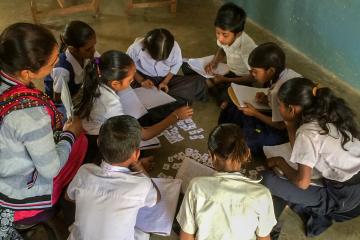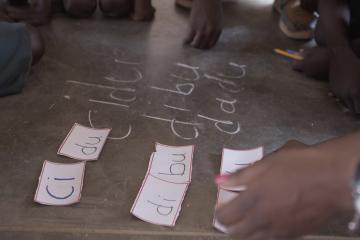
Adapting to learning needs in the wake of COVID-19 using data and evidence

This interview was originally posted on the Brookings Institute blog.
Prior to the outbreak of the COVID-19 pandemic, the Ministry of National Education, Technical Education, and Vocational Training (MENET-FP) of Côte d’Ivoire already had improving primary school learning as a top priority. Results from the 2014 Program for the Analysis of Education Systems (PASEC) demonstrated that many children were falling behind in foundational skills, with only 15 percent of children completing primary school with minimum competency in both math and reading. The COVID-19 pandemic and resulting school closures will likely only exacerbate these low learning outcomes; in fact, the World Bank estimates that globally the pandemic could result in a loss of between 0.3 and 0.9 years of schooling adjusted for quality.
Over the past several months, the government of Côte d’Ivoire has been working hard to provide access to quality learning opportunities during COVID-19 and explore innovative ways to close learning gaps. The Teaching at the Right Level (TaRL) approach offers a promising possibility. TaRL—known as the Programme d’Enseignement Ciblé or PEC in Côte d’Ivoire—is an evidence-based, remedial education approach developed by Indian NGO Pratham that works by dividing children into groups based on learning needs rather than age or grade; dedicating time to basic skills rather than focusing solely on the curriculum; and regularly assessing student performance, rather than relying only on end-of-year examinations. The MENET-FP, together with Transforming Education in Cocoa Communities (TRECC) and TaRL Africa, first adapted and piloted the approach in the Ivorian context in 2018-2019 and have expanded to 200 schools in the past school year to evaluate the potential and lay the groundwork for possible national scale up. TaRL Africa is a joint venture by Pratham and J-PAL that supports partners working to implement the TaRL approach in primary schools in Africa.
The Center for Universal Education (CUE) at Brookings has been collaborating with TRECC over the past several years to implement a Real-time Scaling Lab focused on documenting, learning from, and supporting the process of adapting and scaling PEC in the Ivorian context. Real-time Scaling Labs are a participatory, action research project accompanying initiatives like PEC in the process of scaling while simultaneously drawing transferable findings across cases to inform global policy, practice, and financing. Lessons learned from the labs to date are highlighted in CUE’s recent brief.
I recently had the opportunity to hear from Faustin Koffi, General Inspector in charge of Administration and School Life at MENET-FP and Real-time Scaling Lab manager; Aïda Alassane N’Diaye-Riddick, Côte d’Ivoire country manager with TaRL Africa; and Rob Rogers, senior policy associate at J-PAL. They shared their thoughts and reflections about the promise of the TaRL approach to help provide quality education to all children in Côte d’Ivoire, both in this moment of COVID-19 and beyond.
Molly Curtiss: In your view, how does the TaRL (PEC in Côte d’Ivoire) approach respond to key challenge(s) in the education system and align with existing government priorities? How, if at all, has this changed in light of COVID-19?
Faustin Koffi: Côte d’Ivoire, through its 2016-2025 Education Sector Plan, aims by 2025 to enable all children ages 6 to 11 to access quality education and complete the primary cycle, which is also in line with Sustainable Development Goal (SDG) 4. Achieving this vision will mean that young people and a significant proportion of adults, both men and women, will be able read, write, and compute by 2030.
However, various evaluations have highlighted our children’s low levels in reading and arithmetic, issues which compromise the quality of education. To address this issue, the MENET-FP—choosing from several approaches that were implemented as pilot projects—decided to consider an extension and potential scaling up of PEC. The PEC approach offers the advantage of first measuring the level of learners’ knowledge, in order to better target instruction. This approach, which utilizes a process of ongoing evaluation to respond to learners’ difficulties, has demonstrated convincing results.
Despite the government’s efforts, certainly not all children have been able to access the virtual lessons offered through various channels during COVID-19. After COVID-19, more than ever, it will be necessary to reassess children’s learning levels and target their instruction, and this is exactly what PEC does.
Curtiss: An important feature of implementing and adapting PEC in Côte d’Ivoire has been strong government engagement from the beginning. How are MENET-FP and TaRL Africa collaborating to integrate the PEC approach into existing government systems? What have been the biggest challenges of this approach to date?
Aïda Alassane N’Diaye-Riddick: MENET-FP, with support from TaRL Africa, CUE, and others, have had a deep focus on integrating the PEC approach into their systems from the earliest stages of the partnership. In PEC, MENET-FP experts train government teachers, who then implement the program in public school classrooms. Local government officials also provide ongoing support and mentoring to teachers, and data on learning progress is reviewed at every level of the Ministry. At the highest levels, the MENET-FP, with support from TaRL Africa, has formalized the governance structures of PEC with a high-level steering committee and a national coordination team, who lead on the strategy, coordination, and operations for scaling. A consultative group ensures that donors and private sector partners coordinate their activities and mobilize resources to support the program. This formal integration of PEC into the government systems has been critical for buy-in and ownership from local stakeholders, and we believe it will be critical for the sustainability of the program as it scales up in Côte d’Ivoire.
In terms of challenges, one difficulty we have seen is that it takes time to empower leaders at the regional and local levels to fully take ownership of the approach. But over the past few years, we have seen these “leaders of practice” take more and more ownership over the PEC reform. At TaRL Africa, we are doing everything we can to equip these leaders with the tools necessary to take the approach forward to help children catch up and thrive in Côte d’Ivoire’s schools.
Curtiss: A critical element of the PEC approach is regularly assessing children’s learning levels, so that teachers can group students and provide targeted instruction. Can you talk about how this timely data on student learning has also been useful outside the classroom to inform government planning, decisionmaking, and prioritization, in particular for efforts to reach all children, including the most vulnerable?
Rob Rogers: At J-PAL, we have worked for years with Pratham to better understand what makes their TaRL program so effective when implemented well. A series of randomized evaluations in India have shown that using data to drive program decisions is critical to making the program work within government systems. In TaRL, children are assessed throughout the year, and these data are then used to inform a broad range of decisionmaking, from in-class grouping of children to targeted mentoring support for teachers to program review at the national level. In Côte d’Ivoire, we have seen how having timely data on children’s learning helps leaders at all levels of the government reorient the system toward children’s learning. The MENET-FP has been using this information not only to better implement and scale up PEC, but also to better understand all children’s learning levels during and after the COVID-19 pandemic, including the most vulnerable children who may be dealing with additional challenges.
Curtiss: How have MENET-FP and TaRL Africa adapted the PEC approach and plans in response to the COVID-19 pandemic? What lessons have been learned about this real-time adaptation that might be applicable beyond the current pandemic and beyond TaRL?
Koffi: Faced with the COVID-19 pandemic, the MENET-FP initiated a global response plan to ensure educational continuity for students. In response, with the support of TaRL Africa, they decided to contribute to this continuity through a radio program to strengthen primary school students’ capacities in mathematics and reading in an environment conducive to learning at home, involving parents, volunteers, or other members of the community.
N’Diaye-Riddick: In Côte d’Ivoire, we had hundreds of thousands of children who have been out of school for two months over the last quarter of the school year due to the pandemic-related school closures. With our support, the government was able to resume PEC activities when schools reopened during the last quarter of the 2019-20 school year, allowing children to learn using a modified teaching format. For the 2020-21 upcoming school year, this modified approach will be maintained.
We feel that the PEC approach is doubly important in this time of COVID-19 response and recovery. At its core, TaRL focuses on helping children catch up by assessing children’s real learning levels and then focusing on the basics in reading and math. PEC puts the learning needs of these children first and leverages high-quality evidence and data, along with the 20+ years’ of Pratham’s experience with the program, to help them catch up.
Curtiss: While the devastating impacts of COVID-19 cannot be overstated, the pandemic offers the global education community the opportunity to learn more about how education systems can adapt to provide learning continuity in the face of massive disruptions. The case of TaRL in Cote d’Ivoire highlights important lessons about how timely data collection and analysis of children’s learning levels can support both targeted instruction to help the most vulnerable children catch up, as well as ongoing learning and decisionmaking at the systems level in respond to this type of crisis.
Some responses have been translated from the original French by the author and lightly edited for length.


